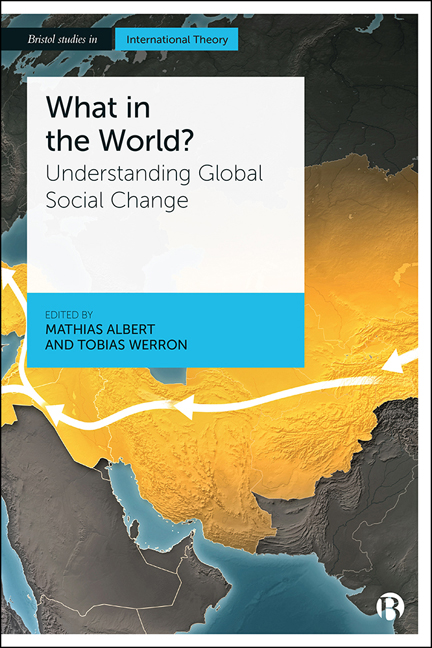Book contents
- Frontmatter
- Contents
- List of Figures and Tables
- Notes on Contributors
- Acknowledgements
- 1 Introduction: World Society and Its Histories – The Sociology and Global History of Global Social Change
- 2 Every Epoch, Time Frame or Date that Is Solid Melts into Air. Does It? The Entanglements of Global History and World Society
- 3 Periodization in Global History: The Productive Power of Comparing
- 4 Communication, Differentiation and the Evolution of World Society
- 5 Field Theory and Global Transformations in the Long Twentieth Century
- 6 Organization(s) of the World
- 7 Particularly Universal Encounters: Ethnographic Explorations into a Laboratory of World Society
- 8 From the First Sino-Roman War (That Never Happened) to Modern International-cum-Imperial Relations: Observing International Politics from an Evolution Theory Perspective
- 9 Nationalism as a Global Institution: A Historical-Sociological View
- 10 States and Markets: A Global Historical Sociology of Capitalist Governance
- 11 The Impact of Communications in Global History
- 12 The ‘Long Twentieth Century’ and the Making of World Trade Law
- 13 Third-Party Actors, Transparency and Global Military Affairs
- 14 Technical Internationalism and Global Social Change: A Critical Look at the Historiography of the United Nations
- References
- Index
5 - Field Theory and Global Transformations in the Long Twentieth Century
Published online by Cambridge University Press: 22 December 2021
- Frontmatter
- Contents
- List of Figures and Tables
- Notes on Contributors
- Acknowledgements
- 1 Introduction: World Society and Its Histories – The Sociology and Global History of Global Social Change
- 2 Every Epoch, Time Frame or Date that Is Solid Melts into Air. Does It? The Entanglements of Global History and World Society
- 3 Periodization in Global History: The Productive Power of Comparing
- 4 Communication, Differentiation and the Evolution of World Society
- 5 Field Theory and Global Transformations in the Long Twentieth Century
- 6 Organization(s) of the World
- 7 Particularly Universal Encounters: Ethnographic Explorations into a Laboratory of World Society
- 8 From the First Sino-Roman War (That Never Happened) to Modern International-cum-Imperial Relations: Observing International Politics from an Evolution Theory Perspective
- 9 Nationalism as a Global Institution: A Historical-Sociological View
- 10 States and Markets: A Global Historical Sociology of Capitalist Governance
- 11 The Impact of Communications in Global History
- 12 The ‘Long Twentieth Century’ and the Making of World Trade Law
- 13 Third-Party Actors, Transparency and Global Military Affairs
- 14 Technical Internationalism and Global Social Change: A Critical Look at the Historiography of the United Nations
- References
- Index
Summary
Introduction
Pierre Bourdieu developed his theory of social fields through his analyses of religion, art and social class in European societies. But how might this theory address the larger theme of the present volume? In other words, how might Bourdieusian field theory account for the ‘emergence and transformation’ of international orders – as Albert and Werron (Chapter 1 in this volume) put it? And how might this field-theoretic account differ from other theoretical approaches? This chapter offers some preliminary thoughts on these questions by reference to three transformative processes (or macrohistorical turning points) during past two centuries that conventional historiographies recognize as crucial for the current political order: the expansion of colonial empires during the phase of ‘high imperialism’ (roughly late nineteenth to early twentieth century), the two world wars (1914–45) and the post-war end of formal colonial empires heralding the rise to dominance of the modern nation state (1946–present).
These three macrohistorical turning points might readily be narrated in terms of an array of other theoretical approaches. Of particular interest here might be differentiation and social evolution theory as discussed in other chapters of this volume (Holzer, Chapter 4; Stetter, Chapter 8). For instance, the first process under scrutiny – the period of ‘high imperialism’ starting in the nineteenth century – might be thought of as the creation of a system of ‘stratified differentiation’ (Albert et al, 2013a). Through the imperial expansion of Western states to encompass nearly the entire world, a stratified order of imperial states and their colonies was created. Similarly, the postwar end of empires and the creation of a global order of nation states in the twentieth century might be thought of as ‘segmented differentiation’: the hierarchical empires collapsed, yielding a system of nominally sovereign and equal nation states (Albert et al, 2013a; see also Luhmann, 1997a: 72). Or the process might be thought of as an intensified period of ‘internal differentiation’ by which new international organizations proliferated alongside nation states and the development of new ‘practices, rules, and organizations’ associated with new primary institutions (Stetter, Chapter 8 in this volume). Relatedly, drawing upon Holzer (Chapter 4 in this volume), the end of empires and the creation of the interstate order might be theorized as concomitant with the universalization of communication and thus the creation of a new global consensus around human rights and principles of national self-determination.
- Type
- Chapter
- Information
- What in the World?Understanding Global Social Change, pp. 81 - 98Publisher: Bristol University PressPrint publication year: 2020

